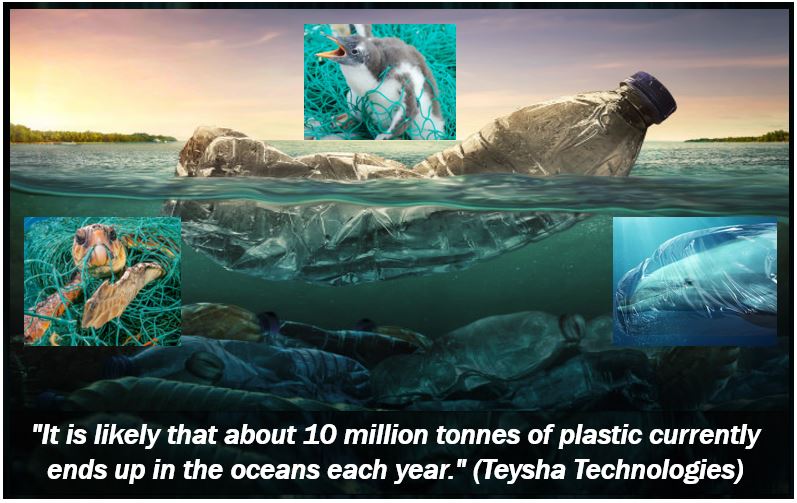On the 1st October 2020, Parliament passed legislation prohibiting the sale of single-use plastic stirrers, straws and cotton buds in England. Forming part of the UK’s 25 Year Environment Plan, it is hoped that the regulations will trigger a significant decline in plastic pollution. Duncan Clark, Teysha Technologies’ Head of Business Operations, recently discussed the company’s innovative range of biodegradable plastic alternatives, outlining potential future applications.

Plastic waste pollution – a serious problem
Until the recent plastic ban in England, 1.8 billion plastic cotton buds, 316 million stirrers, and 4.7 billion plastic straws were used in the country each year. A significant proportion found their way into UK water systems, eventually reaching the ocean.
The catastrophic impact of plastic pollution on the world’s oceans is well documented. According to statistics published by National Geographic:
- Single-use plastic accounts for 40% of total plastic production globally
- 50% of the world’s plastics were manufactured in the last 15 years
- Between 1950 and 2015, global plastic production increased exponentially, rising from 2.3 million tons to 448 million tons
- Conservationists predict that by 2050, global plastic production will have doubled
- Every year, approximately 8 million tons of plastic enters the world’s oceans
- Thanks to various additives increasing flexibility and durability, some plastics could take an estimated 400 years to break down
We need environmentally friendly plastic alternatives
The need to develop environmentally friendly plastic alternatives has never been greater. Across the UK, measures have been taken to reduce reliance on plastics in recent years, including a ban on the use of microbeads in cosmetics, and the introduction of charges for single use plastic shopping bags. Nevertheless, strident measures are still required to meet global targets implemented to reduce plastic pollution.
The obvious answer to the latest plastic ban is transitioning to non-plastic cotton buds, stirrers and straws. While this would irrefutably lead to a reduction in visible plastic pollution, adoption of paper and metal straws, wooden stirrers and 100% cotton swabs has other costly environmental impacts.
One of the main lures of plastic is its affordability. According to statistics published by Denmark’s Ministry of Environment and Food, production of paper, metal and cotton alternatives to plastic are not only more expensive, but actually trigger increased CO2 emissions. Indeed, the Danish study revealed that, in order to have a more positive environmental impact than a single use plastic bag, a paper bag would need to be used at least 43 times.
Landmark breakthrough – 2nd generation biopolymers
Matthew Stone, Teysha Technologies’ Managing Director, is committed to advancing the development of affordable and effective plastic alternatives. Following years of research, the natural biopolymer specialist company recently achieved a landmark breakthrough, creating second generation biopolymers capable of replacing existing petroleum-based polycarbonates.
Teysha Technologies’ revolutionary innovations utilise monomers and co-monomers, the natural building blocks of plastic, creating a polymer that functions in a very similar manner to traditional plastic. The key distinction is that Teysha Technologies’ monomer feedstocks are naturally sourced, generating environmentally friendly sustainable materials from agricultural waste products and starches, rather than being derived from hydrocarbon-based petrochemicals and fossil fuels.
Teysha Technologies’ next generation biopolymers can be chemically, mechanically and physically adapted to meet the individual needs of various products, producing plastics suitable for applications across a variety of different industries including electrical appliances, packaging and cosmetics.
Interesting related article: “What is the Environment?“

